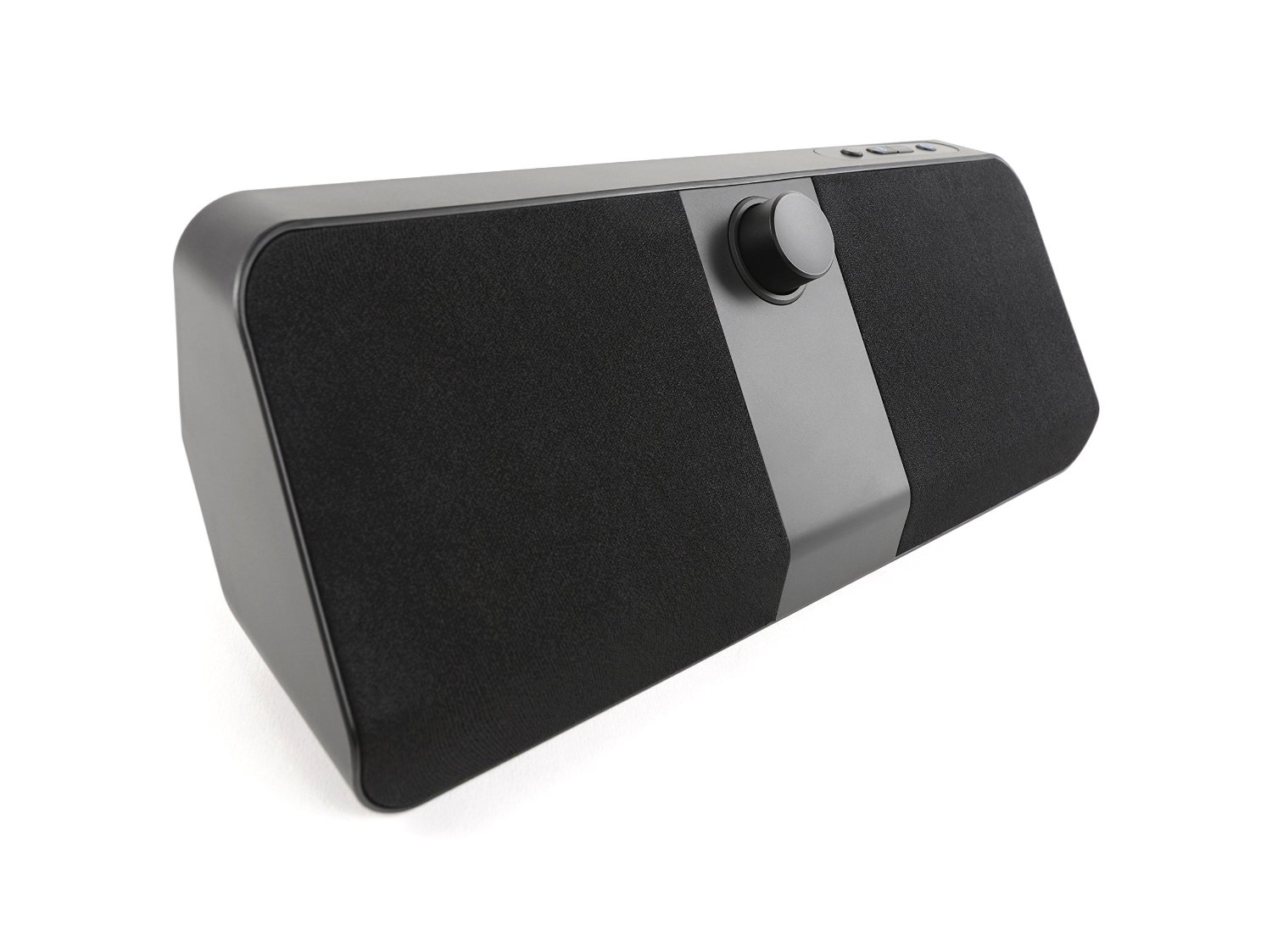Remote tv speakers for hard of hearing – Remote TV speakers for the hard of hearing empower individuals with hearing difficulties to fully immerse themselves in the captivating world of television entertainment. These innovative devices offer a range of advanced features and connectivity options, providing personalized sound experiences tailored to specific hearing needs.
From adjustable volume levels and wireless connectivity to noise reduction and voice enhancement, remote TV speakers are designed to bridge the gap between hearing loss and the enjoyment of television.
Features of Remote TV Speakers for the Hard of Hearing

Remote TV speakers are specifically designed to enhance the TV-watching experience for individuals with hearing difficulties. These devices offer a range of advanced features to meet the unique needs of hard-of-hearing users.
One of the key benefits of remote TV speakers is their adjustable volume levels. These speakers allow users to independently control the volume of the TV audio, ensuring that they can hear it clearly without disturbing others. Additionally, many remote TV speakers feature personalized sound profiles, which enable users to customize the sound output to their specific hearing preferences.
This customization can include adjustments to treble, bass, and other audio settings.
Wireless Connectivity
Wireless connectivity is another important feature of remote TV speakers. This allows users to place the speakers anywhere in the room, without the need for cumbersome cables. Wireless connectivity also eliminates the risk of tripping over cords, making it a safer option for individuals with mobility impairments.
Types of Remote TV Speakers: Remote Tv Speakers For Hard Of Hearing
Remote TV speakers for the hard of hearing come in a variety of types, each with its own advantages and disadvantages. The two main types are wired and wireless.
Wired remote TV speakers are connected to the TV using a cable, typically a 3.5mm audio cable. This type of speaker is generally less expensive than wireless speakers and offers a more reliable connection. However, wired speakers can be less portable and may be more difficult to set up.
Wireless Remote TV Speakers, Remote tv speakers for hard of hearing
Wireless remote TV speakers connect to the TV using a wireless connection, such as Bluetooth or Wi-Fi. This type of speaker is more portable and easier to set up than wired speakers, but it can be more expensive. Wireless speakers may also be more susceptible to interference, which can affect the sound quality.
Connectivity and Compatibility

Remote TV speakers for the hard of hearing offer various connectivity options to pair with TVs. Understanding these connections and ensuring compatibility between the speaker and TV is crucial for seamless operation.
Connection Types
- Bluetooth:Wireless connection using Bluetooth technology, allowing for easy pairing and cable-free setup.
- Optical Audio:Digital connection using an optical cable, providing high-quality audio transmission.
- HDMI:Advanced connection that combines audio and video signals, offering the best sound and picture quality.
Compatibility Considerations
Compatibility between the remote TV speaker and TV is essential. Before purchasing, check the following:
- Connection Type:Ensure the speaker supports the same connection type as your TV (Bluetooth, optical audio, or HDMI).
- Audio Output:Verify that the TV has an audio output port compatible with the speaker’s input.
- Speaker Specifications:Check the speaker’s specifications to ensure it is compatible with your TV’s audio capabilities (e.g., Dolby Atmos support).
Sound Quality and Performance
The sound quality and performance of remote TV speakers play a crucial role in enhancing the listening experience for individuals with hearing loss. Factors such as frequency response, clarity, and distortion need to be carefully considered to ensure optimal audio delivery.
Frequency response refers to the range of frequencies that the speaker can reproduce. A wider frequency response ensures that all the nuances of the audio, from deep bass to high-pitched treble, are accurately conveyed. Clarity refers to the ability of the speaker to reproduce sound without any muddiness or distortion.
Good clarity ensures that speech and other audio elements are intelligible and easy to understand.
Distortion
Distortion occurs when the speaker is unable to reproduce the original audio signal accurately, resulting in a distorted or muffled sound. Minimizing distortion is essential for delivering a clear and enjoyable listening experience.
Additional Features and Considerations

Remote TV speakers for the hard of hearing offer a range of additional features and considerations that can further enhance the user experience and cater to specific needs.
These include noise reduction, voice enhancement, and remote control functionality, as well as important considerations like battery life, durability, and warranty.
Noise Reduction
Noise reduction is a crucial feature for remote TV speakers used in noisy environments. It helps minimize background noise and distractions, ensuring clearer and more intelligible sound transmission.
If you’re seeking an exceptional wireless listening experience, consider the Beats Studio 2.0 Wireless. These headphones boast a sleek design, superior noise cancellation, and immersive sound quality. For an unparalleled surround sound setup, explore the forum best rear speakers for surround sound.
Experts and enthusiasts share insights and recommendations on optimizing your home theater system.
Some remote TV speakers employ advanced noise-canceling technology to effectively suppress unwanted noise, providing a more immersive and enjoyable listening experience.
When setting up a home theater system, choosing the right rear speakers for surround sound is crucial. To gather insights from audio enthusiasts, you can visit the forum best rear speakers for surround sound. Meanwhile, if you’re seeking a high-quality wireless headphone experience, the beats studio 2.0 wireless offers exceptional sound quality and comfort.
Voice Enhancement
Voice enhancement is another valuable feature that improves the clarity and intelligibility of speech. It can be particularly beneficial for individuals with hearing loss who struggle to understand dialogue in TV shows or movies.
Voice enhancement algorithms work by amplifying the frequency range of human speech, making it more distinct from background noise and easier to hear.
Remote Control Functionality
Remote control functionality allows users to conveniently adjust the volume, change channels, and access other settings without having to get up from their seat.
Some remote TV speakers come with dedicated remote controls, while others can be integrated with existing TV remotes or smartphone apps, providing seamless control and ease of use.
Battery Life
Battery life is a critical consideration for portable remote TV speakers. It determines how long the speakers can operate without needing to be recharged.
The battery life of remote TV speakers varies depending on factors such as the size of the speakers, the volume level, and the presence of additional features. Users should choose speakers with sufficient battery life to meet their needs.
Durability
Durability is another important consideration, especially for users who plan to use their remote TV speakers in challenging environments.
Remote TV speakers should be able to withstand accidental drops, bumps, and exposure to dust and moisture. Some speakers may feature rugged construction or protective cases to ensure durability and longevity.
Warranty
Warranty provides peace of mind and protection against defects or malfunctions. It is important to choose remote TV speakers with a comprehensive warranty that covers both the speakers and the accessories.
A longer warranty period typically indicates the manufacturer’s confidence in the product’s quality and durability.
Wrap-Up
In conclusion, remote TV speakers for the hard of hearing are indispensable tools that transform the television experience into an inclusive and accessible one. Their advanced features, ease of use, and compatibility with various TVs make them an invaluable asset for individuals seeking an enhanced and fulfilling audio experience.
Helpful Answers
Are remote TV speakers difficult to set up?
Most remote TV speakers are designed for ease of setup, with simple instructions and user-friendly interfaces.
Can remote TV speakers be used with all types of TVs?
Compatibility varies depending on the speaker and TV models. However, most remote TV speakers offer multiple connectivity options, such as Bluetooth, optical audio, and HDMI, to ensure compatibility with a wide range of TVs.
Do remote TV speakers improve sound quality for people without hearing loss?
While primarily designed for individuals with hearing difficulties, remote TV speakers can also enhance the sound experience for those without hearing loss. They offer adjustable volume levels, personalized sound profiles, and noise reduction features that can improve overall audio clarity and enjoyment.